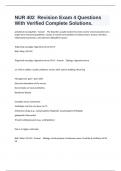NUR 402 Revision Exam 4 Questions
With Verified Complete Solutions.
peripheral neuropathies - Answer The disorders usually involve the motor and/or sensory branches of a
single nerve (mononeuropathies). Causes of cranial nerve problems include tumors, trauma, infection,
inflammatory processes, and unknown (idiopathic) causes.
Trigeminal neuralgia: trigeminal nerve (CN V)
Bell's Palsy: (CN VII)
Trigeminal neuralgia: trigeminal nerve (CN V) - Answer Etiology: trigeminal nerve
s/s: Pain is sudden, usually unilateral, severe, brief, and/or stabbing. Recurring
Management: goal = pain relief.
Electrical stimulation of the nerves
Nerve blocks w/ local anesthetics
Botulinum (Botox)
Complete neuro assessment
Audiologic eval (can you hear me??)
Antiseizure drugs (e.g., carbamazepine [Tegretol], oxcarbazepine [Trileptal])
gabapentin (Neurontin)
Tricyclic antidepressants (e.g., amitriptyline)
Pain is a trigger, avoid pain
Bell's Palsy: (CN VII) - Answer Etiology: facial paralysis of unknown cause. Could be d/t inflamm of CN
VII
,s/s: temporary, numbness and paralysis of half of face;
benign, most revcover 3 wks to 9 mnths
Can affect swallowing (don't chew on affected side)
Management:
Gentle moist heat, massage
Electrical stimulation of the nerve
Prescribed exercises (for muscle tone, not to get rid of the paralysis)
Keep affected eyeball protected (eye lubricant)
MEDS:
Corticosteroids-before paralysis is complete
Tapered off over a 2 week period
Guillain-Barré Syndrome - Answer Etiology: rare, demyelination, autoimmune and follows a viral or
bacterial infection, also is a collection of syndromes that manifest as acute inflammatory polyneuropathy
s/s: acute, rapidly prog, symmetric weakness of the limbs and areflexia. Max weakness in 4 wks.
RESPIRATORY muscles may also be affected and may require mech vent. Bowel and bladder dysfunction
RESP assess: Assess the resp system frequently by rate and depth to determine the need for immediate
intervention, including intubation and mechanical ventilation.
ABG's, and vital capacity (the greatest volume of air that can be expelled from the lungs after taking the
deepest possible breath), lung sounds (are they dimished? What type of effort are they giving to
breath?)
IF SOB if NEW to them... want to call HCP
,Management:
Plasmapheresis (5 times daily or over 5 days)
IV Ig (best if 2 wks onset of s/s)
Myasthenia gravis - Answer Etiology:
Autoimmune process, antibodies attach to acetycholine (ACh) receptors sites at the neuromuscular
junction.
MG will then have fluctuating weakness of certain muscle groups (and the weakness will increase as the
muscle is used)
Women 28 y/o affected more often;
MG has fluctuating weakness of skeletal m.
Usually affects multiple m. groups - eyes and eyelids, chewing, swallowing, speaking, and breathing;
strong in the am and become weak through the
day
s/s: sort of above, also eye problems (diplopia, bilat ptosis,
*MG crisis=acute exacerbation of m. weakness triggered by resp infection, surgery, emotional distress,
pregnancy, certain drug exposure, or corticosteroid treatment ;
In MG crisis, what do we see? M. weakness in areas that affect swallowing and BREATHING, which
results in aspiration, respiratory insufficiency, and respiratory tract infections
Again w/ resp assessment as above.. if new SOB or and resp going to call HCP and pt not going home
Management: Neostigmine (reversible chol inhibitors) produce relieve, corticos, immunosupp, Iv ig,
plasmapheresis
What are the types of SCI? - Answer - Primary injury
, Initial physical disruption of spinal cord
- Secondary injury
Progressive damage mostly due to edema of spinal cord
How do you immediately care for a SCI? - Answer ABCs
- Maintain systolic BP>90 mmHg
Immobilize and stabilize cervical spine
What is spinal shock? - Answer Transient physiological reaction to depression of the cord below the SCI
level. Associated loss of sensorimotor function and flaccid paralysis. Flaccid paralysis symptoms last
several days.
Below level of injury
Decreased reflexes
Loss of sensation
Absent thermoregulation
Flaccid paralysis
Lasts days to weeks
What is neurogenic shock? - Answer Characterized by
- Hypotension (fluids, saline bolus)
- Bradycardia (want atropine)
Loss of SNS innervation
- Peripheral vasodilation
- Venous pooling
- ↓Cardiac output




